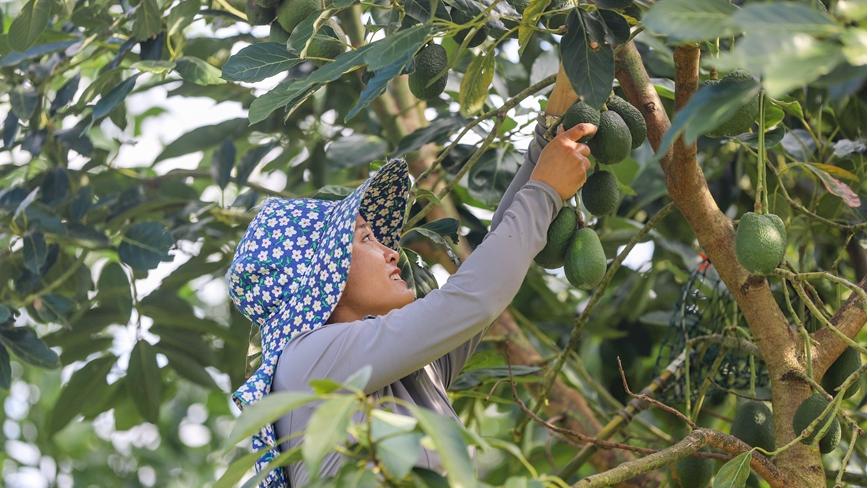Role in global poverty fight wins praise
When addressing the G20 Summit in November in Rio de Janeiro, Brazil, President Xi Jinping recalled his working experience at village, county, city, provincial and central levels, during which poverty alleviation was always a priority and a major task he was determined to deliver on.
With strenuous and unified efforts, China has lifted 800 million people out of poverty, and has met ahead of schedule the poverty reduction target of the United Nations 2030 Agenda for Sustainable Development.
China's story is proof that developing countries can eliminate poverty, and that a weaker bird can start early and fly high, when there is the endurance, perseverance and striving spirit that enable drops of water to penetrate rocks over time, and turn blueprints into reality, the president said.
"If China can make it, other developing countries can make it too. This is what China's battle against poverty says to the world," Xi said.
His speech has won wide recognition for its comprehensive vision and concrete implementation pathways for poverty alleviation.
Brazilian President Luiz Inacio Lula da Silva said during a welcoming banquet for Xi in Brasilia after the G20 Summit that President Xi and he lead the two largest developing countries in the Eastern and Western hemispheres, respectively, noting that both are keenly aware of the people's struggles and are committed to improving livelihoods and eradicating poverty.
Lula expressed deep admiration for China's development achievements under Xi's leadership, particularly the accomplishment in poverty reduction.
Song Wei, a professor at the School of International Relations and Diplomacy at Beijing Foreign Studies University, said that China has completed a suite of effective development tools in eradicating poverty, such as promotion of equitable education, full medical insurance coverage and integration of urban and rural development.
By openly and sincerely sharing its experiences through various platforms such as the Belt and Road Initiative, China aims to provide developing countries with proven strategies and effective policy instruments to reduce poverty, Song said.
Ernesto Soberon Guzman, permanent representative of Cuba to the UN, said it is amazing what China has achieved in poverty reduction, because the country faced a huge challenge, considering the size of its population.
"China has the condition not only to reduce poverty in its own country, but also to help other countries to do it through cooperation projects, such as those under the Global Development Initiative," he said.
Joaquin Alberto Perez Ayestaran, deputy permanent representative of Venezuela to the UN, said the Chinese experience in poverty alleviation is a model for countries of the Global South.
"We have increased our partnership in cooperation (with China) to try to adapt all these policies and programs to the reality of Venezuela, so that we can also achieve the first sustainable development goal, which is eliminating poverty in all its forms and dimensions," he said.
"China has this vision that we are going to be living in a community with a common destiny, this is something we embrace, understanding that we are part of the same planet and we need to live together," Ayestaran added.
Furthermore, he said: "As President Xi Jinping said, if China could make it, all other countries could make it. And if we make it, we should make it all together for the benefit of humanity."
According to a World Bank report published in October, based on the current trajectory, 622 million people, or 7.3 percent of the global population, are projected to be living in extreme poverty by 2030.
If growth does not accelerate and become more inclusive, it will take decades to eradicate extreme poverty and more than a century to lift people above the $6.85 per day poverty line, the report said.
Xu Feibiao, a senior researcher and the director of the Center for BRICS and G20 Studies at the China Institutes of Contemporary International Relations, said that China has on many occasions demonstrated its sense of responsibility and commitment in the global fight against hunger and poverty.
Xu said the root cause of global hunger and poverty lies in unjust governance, including an unequal international order.
As a member of the Global South, China has for decades assisted numerous countries in Asia, Africa and Latin America in promoting development, making itself a long-term and reliable partner for Global South nations, Xu said.
In recent years, China has been actively sharing its poverty alleviation experience with the world through concrete actions, such as by implementing a series of "small yet beautiful" livelihood projects tailored for other countries.
The practice has been a hot topic in China's foreign aid community since Xi said at a symposium on Belt and Road development in 2021 that such livelihood projects should be prioritized in facilitating overseas cooperation.
Xi proposed at the third Belt and Road Forum for International Cooperation in 2023 that China should aim to launch 1,000 such projects.
Ayestaran, the Venezuelan representative, said the "small yet beautiful" tailored projects are perhaps the best of the projects that the GDI has, as they bring tangible results for the day-to-day life of grassroots and local communities.
"So these projects are something on which Venezuela is working a lot, hand in hand with China," he added.
Marthinus Christoffel Johannes Van Schalkwyk, deputy permanent representative of South Africa to the UN, said that these smaller-scale projects will make a big difference in developing countries, especially in impoverished communities in rural areas.
That's extremely important because the projects really have an impact and bring a lot of change, and also create goodwill among local people and enhance their understanding, he said.
Song, the Beijing Foreign Studies University professor, said that "small yet beautiful" projects, funded through grants, play an essential role in alleviating poverty, improving people's livelihood and promoting sustainable development.
One of the highlights of such projects is the Juncao (mushroom grass) cultivation assistance program.
In 2001, Juncao technology was transferred to Papua New Guinea for the first time as an official aid project. Over the past 20 years, this technology has been adopted in more than 100 countries.
Lin Dongmei, deputy director of the China National Engineering Research Center of Juncao Technology, said the global demand for Juncao technology is still increasing. She said that she receives technical guidance requests from around the world almost every day.
Over the next five years, Lin and her team plan to establish and operate regional demonstration centers in the South Pacific, Africa and Latin America to further advance the globalization of Juncao technology.
Professor Song said that China's international cooperation on Juncao technology has had a positive influence in areas such as food security, poverty alleviation, gender equality and inclusive development.
It reflects China's commitment to not only providing aid but also helping improve recipients' production and development capabilities, Song said.
Photos
 Menglian in SW China's Yunnan produces over 80 percent of country's avocados
Menglian in SW China's Yunnan produces over 80 percent of country's avocados 37th Sun Island Int'l Snow Sculpture Expo begins trial operation in China's Harbin
37th Sun Island Int'l Snow Sculpture Expo begins trial operation in China's Harbin Explore an immersive cultural and creative products market at the Xinjiang Library
Explore an immersive cultural and creative products market at the Xinjiang Library Yuyuan Garden Lantern Fair to light up Shanghai on New Year's Day
Yuyuan Garden Lantern Fair to light up Shanghai on New Year's Day
Related Stories
- Xi's State Gifts: A Quilt Gifted to Xi Jinping
- Stories of China's major-country diplomacy: We sing 'Ode to the Motherland' for Grandpa Xi
- Stories of China's major-country diplomacy: Explore sincere friendship between Tajikistan and China
- Xi presents order to promote military officer to rank of general
- Highlights of Xi's speech marking Macao's 25th return anniversary
Copyright © 2024 People's Daily Online. All Rights Reserved.





